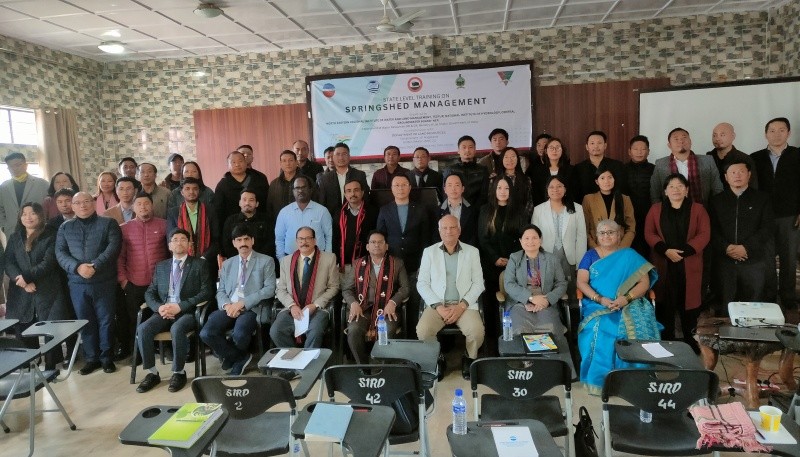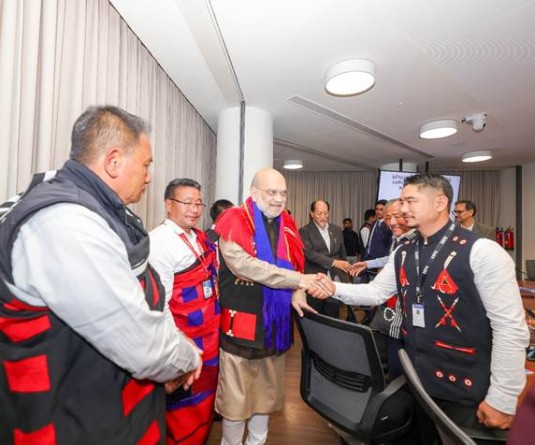Participants and resource persons of the three-day state level training on springshed management held from December 13 to 15.

Dimapur, December 16 (MExN): A three-day state level training on springshed management was held from December 13-15 at the Conference Hall of SIRD. The event was organised by the North Eastern Institute of Water and Land Management (NERIWALM), Tezpur in collaboration with Central Ground Water Board -NER (CGWB), Guwahati, National Institute of Hydrology (NIH), Roorkee, Department of Water Resources, RD and GR, Ministry of Jal Shakti, Government of India and Department of Land Resources, Government of Nagaland.
According to a press release received here on Friday, the inaugural programme on December 13 was chaired by Albert Ngullie, Additional Director, Department of Land Resources and welcome address was delivered by A Pangjung Jamir, Director, Department of Land Resources. Jamir welcomed all the participants and expressed hope that the training would help in the implementation of water related programmes in the state. He also highlighted about the Springshed Development Programmes being taken up by the Department in the state.
The welcome address was followed by short addresses by T Rajababu, senior Scientist, CGWB- NER and Dr SV Vijayakumar, Head, NIH, NERC. Both speakers emphasised on the role of springs as a primary source of water for the rural households in hilly areas and stressed on the interconnection of springs and impact of other developmental activities taking place in the springshed areas while calling for maintaining the national database of springs in a systematic way.
Other activities during the training included the screening of a video clip on ‘Springshed Management in Nagaland- a strategy for climate proofing.’ This was followed by technical sessions on various topics including ‘Hydrological Overview of Country and Water Budgeting for effective Water Resources Management’ by Dr SV Vijaya Kumar, Scientist G, NIH, NERC, Guwahati; ‘Overview of springs: importance, problems, genesis and types’ by Dr SS Rawat, NIH, Roorkee; ‘Hydrology with special reference to springs in NE States’ by Shashinlo Kent, Scientist B, CGWB; ‘Mapping of geological features in context of genesis of springs’ by Mophi Mili, Scientist B, CGWB; and ‘Data Requirement for Spring inventorisation and application of open source tool for field data collection’ by Dr Deepak Singh Bisht, Scientist B, NIH.
The release stated that the second day of the training started with the technical session on ‘Water Chemistry and Geo- chemical analysis of spring water’ by Dr Keisham Radhapyari, Scientist, CGWB, NER, Guwahati and ended with a field visit to the Thizama Village Springshed area for hands-on training on field data collection by using Kobo Collect app, and water quality testing of spring waters.
Meanwhile, the third and last day of the training started with a technical session on the topic ‘Estimation of spring aquifer and dynamic storage of springs’ by Dr Dipjyoti Khound, Scientist C, CGWB. The second technical session was taken up by Dr M Panner, Scientist, CGWB-NER, Guwahati on the topic ‘Water conservation efforts for sustainability of springs,’ and the third session was on the topic ‘Technique for springshed mapping’ by Dr SS Rawat, Scientist E, NIH.
The fourth technical session was also taken by Dr Rawat on the topic ‘Spring vulnerability mapping’ which was followed by a technical session was on ‘Management and visualisation of field data on QGIS’ by Dr Deepak Singh Bisht, Scientist B, NIH.
During this session the spring data which were collected by the participants from the field visit to Peso Dzükhou Springshed area at Thizama Village were plotted on QGIS. The training ended with a valedictory function wherein there were discussions, and feedbacks from the participants. Certificate of participation were also handed over to all the participants, the release stated.






